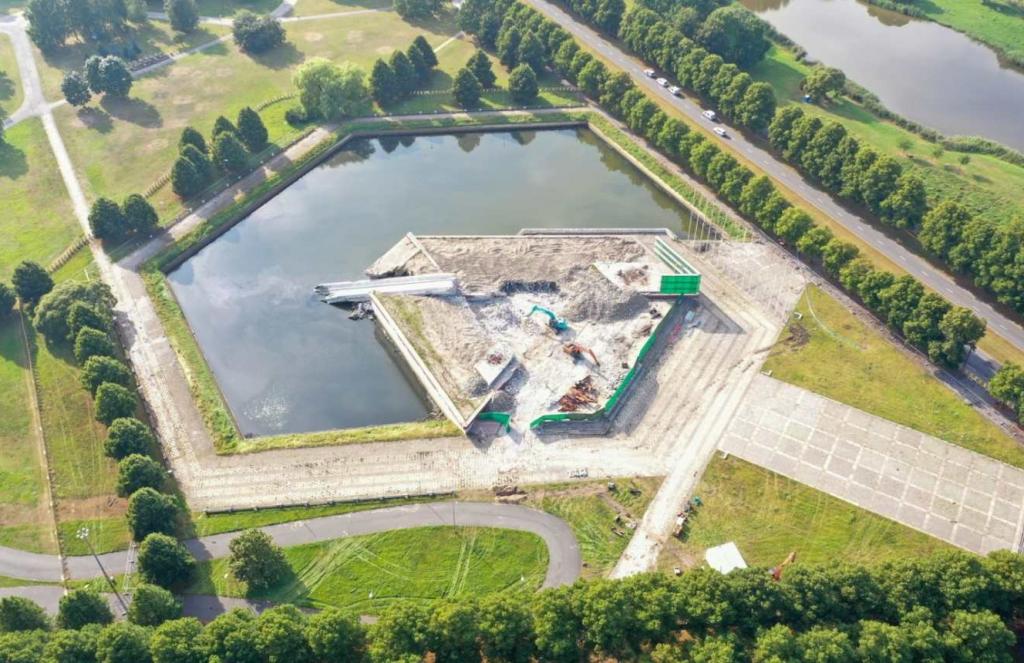Thessaloniki gets ready for its metro launch in November
The underground rapid transit lines have been under construction for almost two decades due to various project delays
 TheMayor.EU logo
TheMayor.EU logo 
The Soviet monument in Victory Park, Riga, shortly after its demolition in August 2022, Source: Valsts policija/ Riga Municipality
The promotion of democracy couldn’t have been possible without the lustration of public spaces
Following the Russian invasion of Ukraine, many Eastern European countries woke up to the fact that their urban spaces still feature monuments, names, plaques and reminders of their historical connection to the Soviet Union totalitarian regime.
In response, Latvia was one of the first to adopt a law decreeing that all objects glorifying authoritarian regimes must be destroyed by 15 November. Once that day passed, the Riga City Council was glad to announce that the job had been completed in the capital.
The law aimed to promote democratic ideals by banning the public display and glorification of authoritarian ideologies, such as Nazism and Soviet Communism. The issue, however, was thorny as the city’s most prominent monument in Victory Park commemorated the liberation of Latvia by the Soviet troops from the Nazi German invaders. In a sense, glorifying one brutal ideology over another. What’s more, Latvians considered it a symbol of the occupation of their country by the USSR.
The 79-metre monumental obelisk in Victory Park went down at the end of August and the move was cathartic as it showed that Rigans were finally ready to abandon the ghosts of the past and embrace a more inclusive, open, free and democratic society.
"We first thought of renaming the monument. But this was not accepted by the population. After this proposal, people started to donate to have this monument taken down. These donations covered the expenses to demolish it," explained Martins Stakis, mayor of Riga in an interview with Euronews.
In addition, these monuments have continued to serve as a reminder of Russia’s political interference and interests in the now independent and sovereign countries of Eastern Europe. Indeed, only two days ago, The Baltic Times reported that Moscow has now initiated a criminal case and proceedings against the dismantling of the monuments.
The Latvian Foreign Ministry has officially informed Russia that its efforts of exercising extraterritorial criminal jurisdiction must be regarded as an intervention in the domestic affairs of the Baltic country. Those attempts are at variance with the Charter of the United Nations.

The underground rapid transit lines have been under construction for almost two decades due to various project delays

Now you can get your wine in Talence by paying directly in Bitcoin

That’s because the state has to spend money on updating the railway infrastructure rather than subsidizing the cost of the popular pass

Rethinking renewable energy sources for the urban landscape

The examples, compiled by Beyond Fossil Fuels, can inform and inspire communities and entrepreneurs that still feel trepidation at the prospect of energy transition

Now you can get your wine in Talence by paying directly in Bitcoin

The 10th European Conference on Sustainable Cities and Towns (ESCT) sets the stage for stronger cooperation between the EU, national and local level to fast track Europe's transition to climate neutrality.

At least, that’s the promise made by the mayor of Paris, Anne Hidalgo

The underground rapid transit lines have been under construction for almost two decades due to various project delays

At least, that’s the promise made by the mayor of Paris, Anne Hidalgo

Hostal de Pinós is located in the geographical centre of the autonomous region

Despite its church-y name, the district has long been known as the hangout spot for the artsy crowds

Urban dwellers across the EU are having a say in making their surroundings friendlier to people and the environment.

Forests in the EU can help green the European construction industry and bolster a continent-wide push for architectural improvements.

Apply by 10 November and do your part for the transformation of European public spaces

An interview with the Mayor of a Polish city that seeks to reinvent itself

An interview with the newly elected ICLEI President and Mayor of Malmö

A conversation with the Mayor of Lisbon about the spirit and dimensions of innovation present in the Portuguese capital














